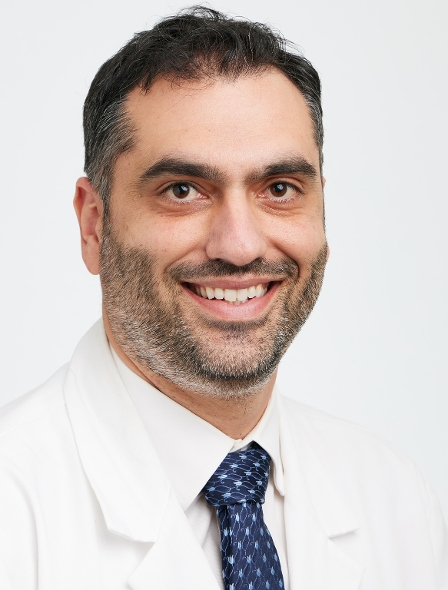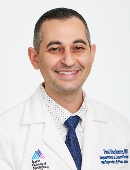Shoulder Pain

Shoulder pain is very common. It can stem from a variety of causes, including poor posture and weak back muscles. Sometimes it happens gradually, and sometimes it strikes suddenly. At Mount Sinai, we can quickly diagnose the cause of your shoulder pain and prescribe effective treatment, often at your first visit.
Conditions We Treat
The most common types of shoulder pain we see are:
- Calcific tendinitis happens when you develop calcium deposits in your rotator cuff tendons. You might experience sudden, severe pain that starts in the morning. This condition often affects middle-aged and older adults and people with diabetes
- Cartilage tears are a result of a rip in the ring of cartilage around your shoulder socket, we call it a tear. These tears can create a lot of inflammation and be extremely painful. We can help to diagnose and treat you and get you back to participating in the activities that you enjoy
- Frozen shoulder (adhesive capsulitis) occurs when the tissue around your shoulder becomes thick and stiff. It can happen due to a rotator cuff condition or injury. You may be unable to move your shoulder for weeks or months. This condition tends to affect women between the ages 40 to 60 as well as people with diabetes, high cholesterol, or thyroid disorders
- Osteoarthritis can happen from aging or from hard work. It can be so severe that it may require a surgical shoulder replacement. Our anti-inflammatory approach to shoulder osteoarthritis can help you delay or even prevent surgery
- Rotator cuff injuries and irritations. If you have irritation, inflammation, or compression around shoulder joint muscles and tendons, you might have a rotator cuff impingement. This condition usually stems from everyday wear and tear. If part of the tendon detaches from the bone, then you have a rotator cuff tear. A tear typically is the result of an injury
We usually diagnose shoulder pain using a physical examination and imaging tests. The imaging scans we rely on most often are X-rays, magnetic resonance imaging (MRI), myelography/computed tomography scanning, and electrodiagnostic studies.
Treatments We Offer
If resting and over-the-counter anti-inflammatories and pain medications don’t relieve your shoulder pain, it is time to consult a doctor. At Mount Sinai, we use a variety of treatments, depending on your diagnosis. Our approaches include these treatments:
- Acupuncture: This approach involves inserting thin needles into specific points (meridians) to enhance the flow of energy (chi) into the shoulder. It can help relieve chronic shoulder pain
- Medication: We often use medicine, especially with rotator cuff conditions, frozen shoulder, and osteoarthritis. We often use anti-inflammatories such as ibuprofen and naproxen. We may also prescribe pain relievers such as acetaminophen, muscle relaxers, or antidepressants. However, we rarely if ever use opioids
- Physical therapy: This approach can decrease pain and stiffness and improve your mobility and strength. Physical therapists use heat, ice, ultrasound, electrical stimulation, and manual techniques. You may learn shoulder pain exercises to perform at home
- Regenerative techniques: These techniques, such asplatelet-rich plasma, use your own cells to promote healing and reduce pain and inflammation
- Targeted anti-inflammatory injections help relieve pain and inflammation in a specific spot. These injections can help treat a variety of shoulder conditions





